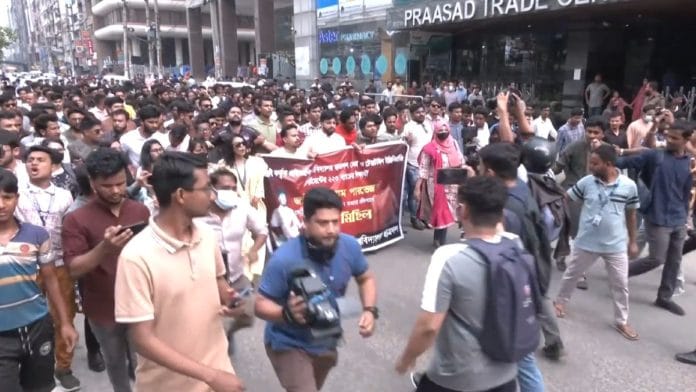New Delhi: For the first time since the Muhammad Yunus-led administration assumed power in August 2024, tensions spilled onto the streets of Dhaka this week, pitting the Bangladesh Nationalist Party (BNP) against the interim government.
With patience running thin, Bangladesh’s capital city Wednesday saw public demonstrations and renewed calls for a general election date as thousands of BNP supporters marched through Dhaka, demanding the swearing-in of their party’s candidate as mayor.
The protests, ongoing for a week now, marked a significant escalation, positioning BNP, widely viewed as the leading contender in the general election—whenever they are held—in direct confrontation with the caretaker administration.
The immediate catalyst for the unrest was BNP’s allegation that the interim government blocked an Election Commission ruling declaring its candidate Ishraque Hossain as the rightful winner of the disputed 2020 mayoral polls. The polls, it was alleged at the time, were rigged by the now-banned Sheikh Hasina-led Awami League.
On 27 March, a tribunal declared Hossain the rightful mayor of Dhaka South City Corporation, with the Election Commission issuing a formal gazette notification to that effect on 27 April. The High Court was expected to rule Thursday, on a petition seeking to stay the move, after having deferred its verdict the previous day.
Hossain joined demonstrators in Dhaka Wednesday, demanding the resignation of interim government advisers Asif Mahmud and Mahfuj Alam, accusing them of obstructing the legal transition of power and acting as de facto political agents, The Daily Star reported.
His supporters locked city offices, disrupted services, and took to the streets. “This movement is not about me,” Hossain told supporters during a sit-in at Kakrail Mosque in Dhaka late Wednesday night. “It’s about protecting democracy. We will stay on the streets until those who sabotage it step down.”
Also Read: India cites reciprocity, fairness as it curbs market access for Bangladeshi goods
Turning the tide, delayed elections
The interim government has thus far maintained silence on the protests and refused to comment on demands for the advisers’ resignations. But the cost of inaction is mounting.
Hossain during his sit-in asserted that the protest was not about securing a court verdict or claiming the mayor’s office. “From the beginning, we have said that we are here to expose the role of these political appointees inside this government, and they must resign immediately. That is our main and foremost demand,” he said.
He added that while the legal process would continue—whether or not the court ruled in his favor—the larger issue was political. “What matters the most is the government must understand that BNP will not accept any election under this so-called advisory council. Nor will the people. No fair and neutral election can be held under such conditions,” he said.
Other BNP members said the movement, initially confined to a legal dispute over a mayoral seat, is quickly evolving into a broader standoff over governance, electoral credibility, and the role of non-elected advisers in the state apparatus.
At an event in Dhaka Wednesday, senior BNP leader Dr Abdul Moyeen Khan warned the interim government against delaying the general election under the pretext of structural reforms. “People can turn against those they once admired,” he said. “The public will not accept elections under this advisory council. We are cooperating now, but that may not last.”
Boiling tensions, war of words
BNP’s frustration reached a boiling point after National Security Adviser (NSA) Khalilur Rahman Wednesday publicly questioned the legitimacy of BNP acting chairman Tarique Rahman, who has been in exile in the UK for several years now.
In a public statement, BNP senior joint secretary general Ruhul Kabir Rizvi lashed out at Khalilur, accusing him of repeating the “fascist rhetoric” of the Hasina regime and calling for his immediate removal. “Where was Dr Khalilur during the darkest years of dictatorship?” Rizvi asked during a press conference at BNP’s central office in Dhaka Wednesday.
“I want to tell Chief Adviser Dr Muhammad Yunus: You have appointed someone as the NSA who has no visible contribution to the country. He is not for Bangladesh—people are beginning to question whether he works for foreign interests,” he added.
Khalilur dismissed the accusations and suggested that by the same logic, BNP’s own leadership, particularly Tarique Rahman, could be accused of working for foreign interests. “If you throw stones, be prepared for others to get hit too,” he warned.
(Edited by Amrtansh Arora)
Also Read: Can Bangladesh afford electoral democracy right now? Stability should come first






